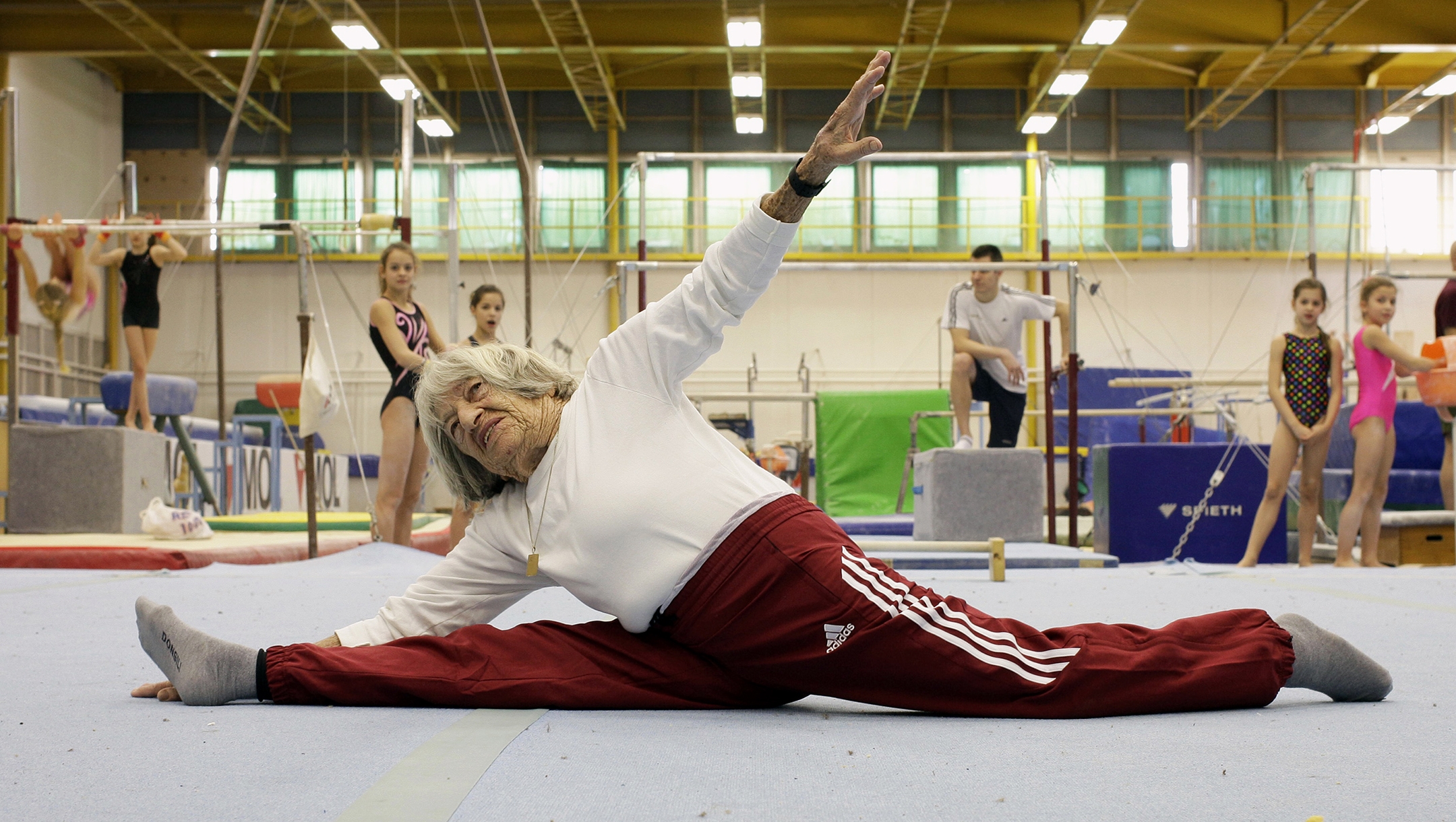Agnes Keleti, Holocaust survivor who won 10 Olympic gymnastics medals, dies at 103
Keleti moved to Israel in 1957 and helped build the new country’s gymnastics program

Agnes Keleti performs a split in front of Hungarian young gymnasts Budapest on January 16, 2016. (Peter Kohalmi/AFP/Getty Images)
(JTA) — As a teenager, Agnes Keleti’s athletic pursuits were interrupted by the Nazis, who murdered her father along with more than 500,000 other Hungarian Jews.
As a centenarian, she became a global sensation for not only surviving the Holocaust but returning to sports, resuming her gymnastics career to become one of Hungary’s most decorated athletes.
Keleti died Thursday at 103 in Budapest, to which she returned after decades in Israel — where she is credited with creating the country’s gymnastics program — to live near her son. She was one week shy of her 104th birthday.
“I was strong and I worked hard,” Keleti told the Jewish Telegraphic Agency in 2019, when she was 98. “Nobody asked questions.”
She was referring to her success surviving the Holocaust by working as a maid under false papers. (Her mother and sister were saved by Raoul Wallenberg, a Swedish diplomat who saved thousands of Hungarian Jews before being abducted by the Russians.) But she could have been summarizing her athletic career, which remains unparalleled in an era of ultra-young gymnastics champions.
After World War II, Keleti resumed her training as a gymnast in 1946. She was prevented from competing at the London Olympics in 1948 because she broke her collarbone in training.
But four years later she won her first Olympic gold medal, in the floor exercise, at the 1952 Helsinki Games. Keleti was 31, competing against athletes 10 years younger. She also won a silver medal and two bronze medals in other events, including uneven bars.
This would have been a respectable pinnacle for the career of any professional athlete. But for Keleti, it was merely the warm-up to her spectacular performance at the ’56 Olympics in Melbourne. At 35, competing against gymnasts half her age, she collected four gold medals and two silver.
Her 10 total medals remains tied for most in Hungary’s history; fewer than 30 athletes from any country have ever won more. Under Hungarian policy, which awards a monthly stipend to Olympians based on the number of medals they won, Keleti lived comfortably in her old age.
But for most of her life, she did not live in the country she represented. She moved to Israel in 1957, recalling despite dementia at 98 that she had wanted to leave communist Hungary because of antisemitism there.
“It wasn’t a good atmosphere to be Jewish, even for a star athlete,” she said at the time.
She ended up in Israel at the urging of a former teacher from Budapest, who persuaded her to attend the 1957 Maccabi Games after she sought asylum in Australia when she was stranded there because of political violence in Hungary. The country was so poor and Keleti’s sport so undeveloped that she had to bring her own bar and rings — but she quickly became a national hero who trained generations of gymnasts.
In 1972, Keleti joined Israel’s Olympic team in Munich but was away from the country’s quarters when Palestinian terrorists attacked and killed 11 members of the delegation.
Keleti’s star resurged in the social media era, when clips of her performing as a young adult and continuing to stretch on an Israeli beach circulated annually around her birthday as a symbol of Jewish perseverance despite the Holocaust. A video produced by Kveller, JTA’s sister site, has been viewed 33 million times on Facebook alone.
https://www.facebook.com/watch/?v=2262493157128652
In Israel, Keleti also married and had two sons.
“I grew up knowing my mother was Wonder Woman,” son Raphael told JTA in 2019. “She ran the household, she taught us music, helped with our homework, cooked meals so tasty that all the neighbors’ kids wanted to stay for dinner. Oh, and in her spare time she was an international and local celebrity who traveled to coach athletes at the Olympic Games. No biggie.”














